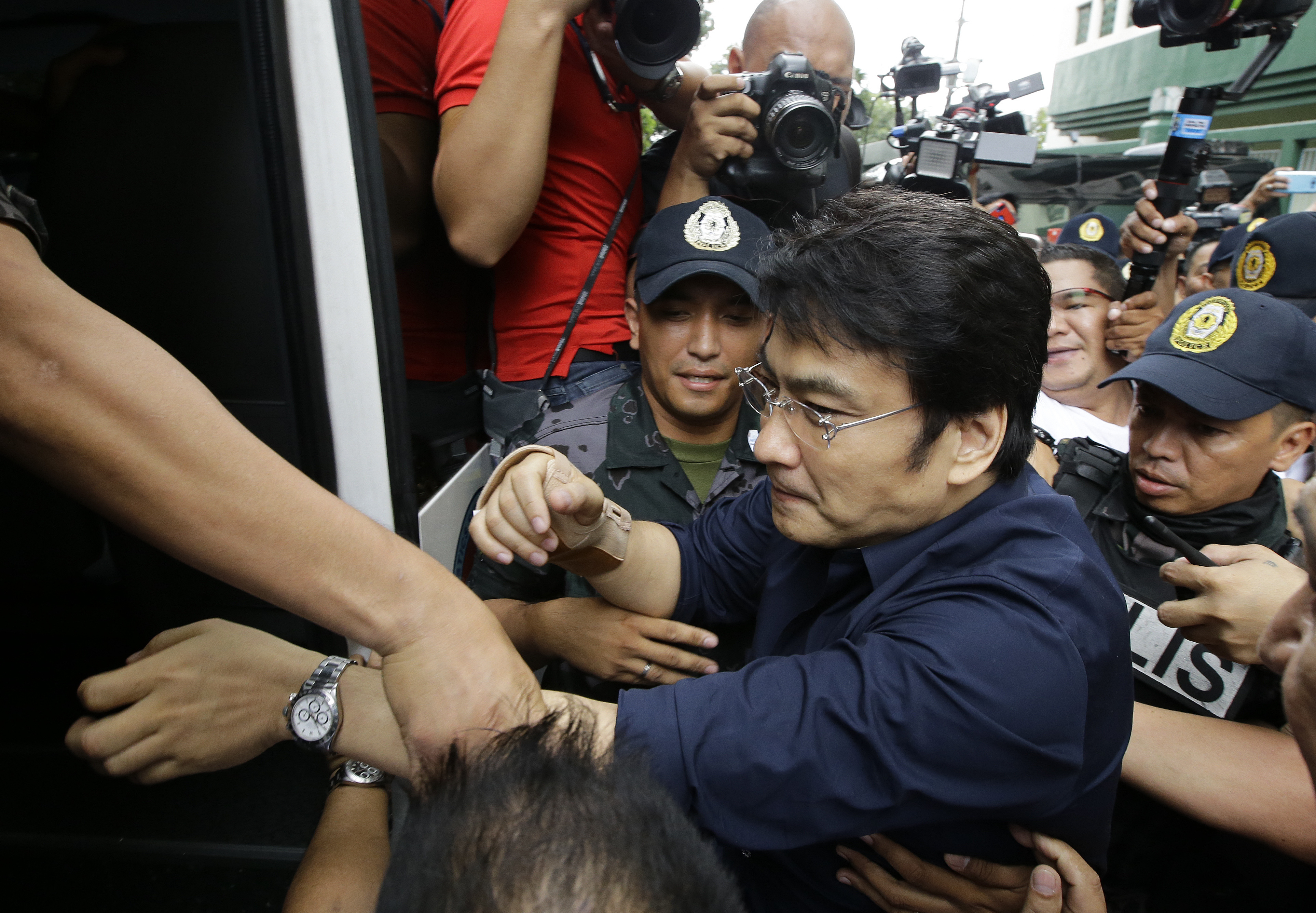
Filipino actor and former Philippine Senator Ramon ‘Bong’ Revilla Jr. is escorted by police after the promulgation of a plunder case at the Sandiganbayan anti-graft court in metropolitan Manila, Philippines on Friday, Dec. 7, 2018. Revilla was cleared of plunder by the court but two other co-accused, Revilla’s former chief of staff Richard Cambe and businesswoman Janet Lim Napoles, were found guilty of the charge in a scandal that broke out years ago that involved huge government funds intended for anti-poverty projects being stolen by several accused legislators. (AP Photo/Aaron Favila)
Had the decision of Sandiganbayan Associate Justice Efren de la Cruz on Bong Revilla’s plunder case prevailed, it would have pointed out that the former senator’s legislative officer Richard Cambe and businesswoman Janet Lim-Napoles could not have pocketed any of his pork barrel funds without his participation.
“The power [over the Priority Development Assistance Fund (PDAF)] is exclusive to Revilla. For Napoles and Cambe to infiltrate the money, they needed Revilla,” De la Cruz said.
But in the final 3-2 decision, the Special First Division of the antigraft court acquitted Revilla but convicted Cambe and Napoles because Ombudsman prosecutors could not prove “beyond reasonable doubt” that the actor-politician had received kickbacks from his PDAF.
Original 3 members
De la Cruz penned the original 141-page decision of the three-member First Division that tried the case but two members—Associate Justice Geraldine Faith Econg and Edgardo Caldona—voted to acquit Revilla.
Following Sandiganbayan rules, two other members of the court—Associate Justices Georgina Hidalgo and Ma. Theresa Dolores Gomez-Estoesta—were brought in to form a five-member Special First Division in order to get at least three votes to back any decision.
De la Cruz said that as a seasoned senator, Revilla “is not naïve” to allow Napoles and Cambe to dispense his PDAF.
“It is ludicrous that Revilla would casually exercise a lofty power gratis, while leaving Napoles and Cambe whom he has no blood relation or filiation of strong degree, to reap benefits alone,” he added.
Three justices—Econg, Caldona and Hidalgo—disagreed with him. As a result, De la Cruz’s draft became a dissenting opinion. Econg wrote the final decision.
The improbability of one of Revilla’s employees running the scam under his nose was downplayed by the majority as just a presumption unsupported by concrete evidence.
The majority ruled that the prosecution could only prove that Napoles gave Cambe P124.5 million in kickbacks from the ghost projects because Revilla’s signatures on the endorsement letters for the release of PDAF funds were forged.
Methods ‘unacceptable’
De la Cruz said the methods used by document examiner Desiderio Pagui, Revilla’s witness who said the signatures could not have been made by the former senator, were “unacceptable.”
He said Pagui took “just a few minutes” examining several suspected “Bong” signatures.
The justice also objected to the majority’s position to excuse Pagui’s examination of signatures in photocopies of endorsement letters.
Assuming the signatures were forged, De la Cruz said this was because “Revilla knew and consented to the affixing of his signature on these documents.”
He was also convinced Revilla had authorized Cambe to transact with Napoles.
“Cambe operated under Revilla’s authority, and Revilla was all over the scam scene, although he remained in the shadow,” De la Cruz said.
Estoesta gave weight to the report of the Anti-Money Laundering Council (AMLC) report, which stated that from April 6, 2006, to April 28, 2010, he and members of his family made numerous deposits amounting to P87.63 million within 30 days of dates mentioned in the financial ledgers of star witness Benhur Luy.
She described the AMLC report as “a financial analysis of the irrefutable burgeoning wealth of Senator Revilla.”
Defense of denial
“He simply wallowed in his own defense of denial and forgery. Why should the majority opinion now take the cudgels for him?” she said.
Estoesta lamented “the ease with which the main accused could be extricated from all this complicity.”
“This consequential ruin runs deep and may eventually free a man once accused of having conspired in raiding the public treasury to hundreds of millions,” she said.